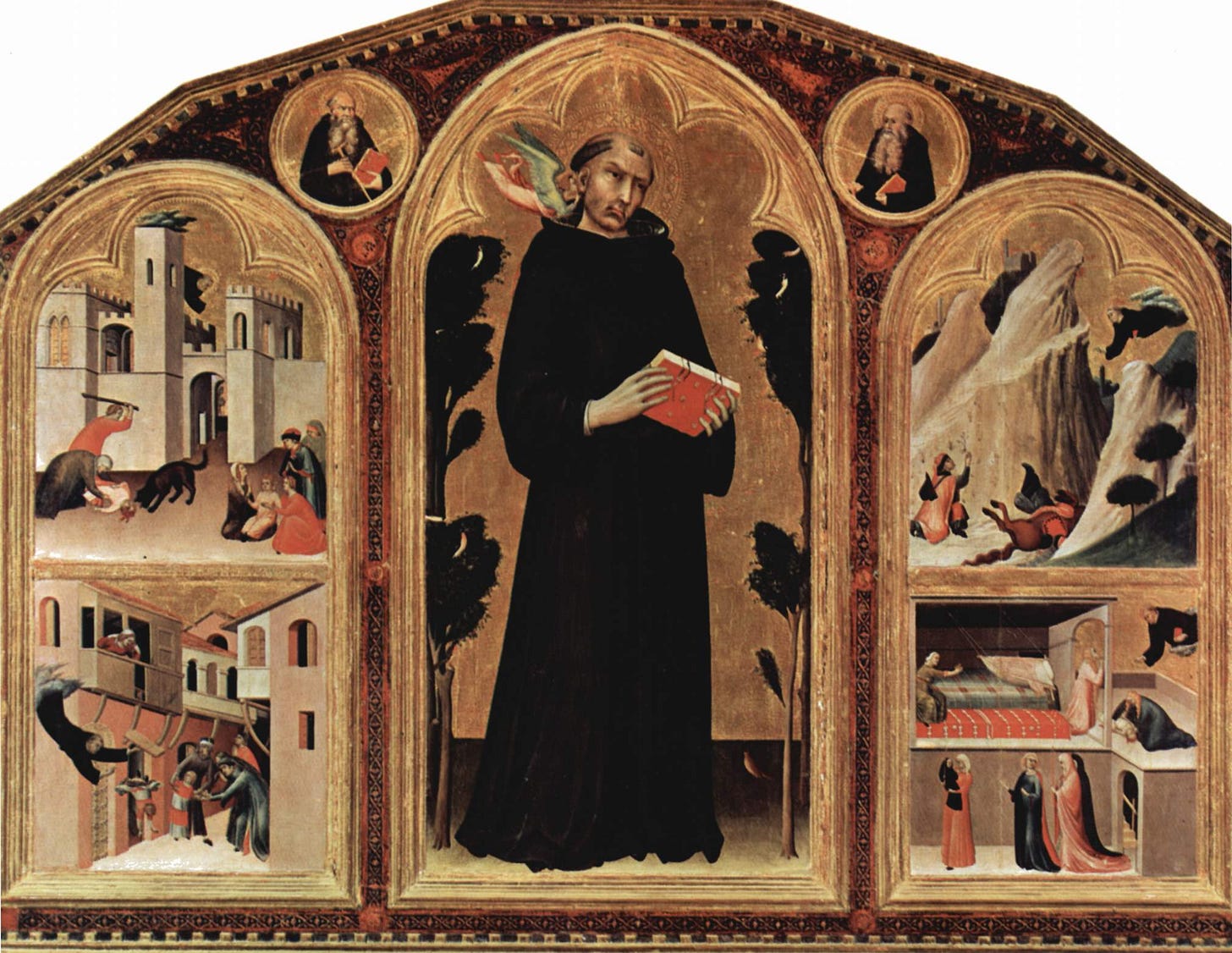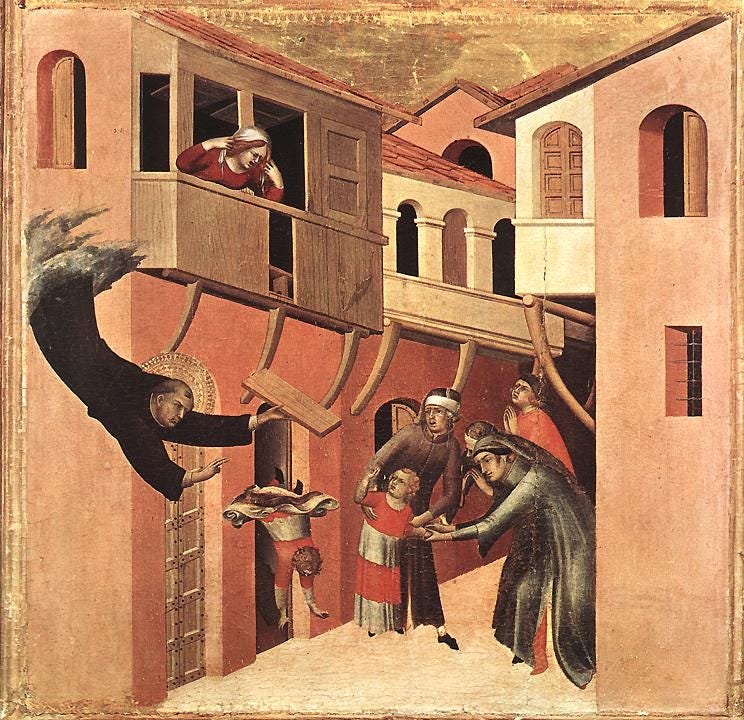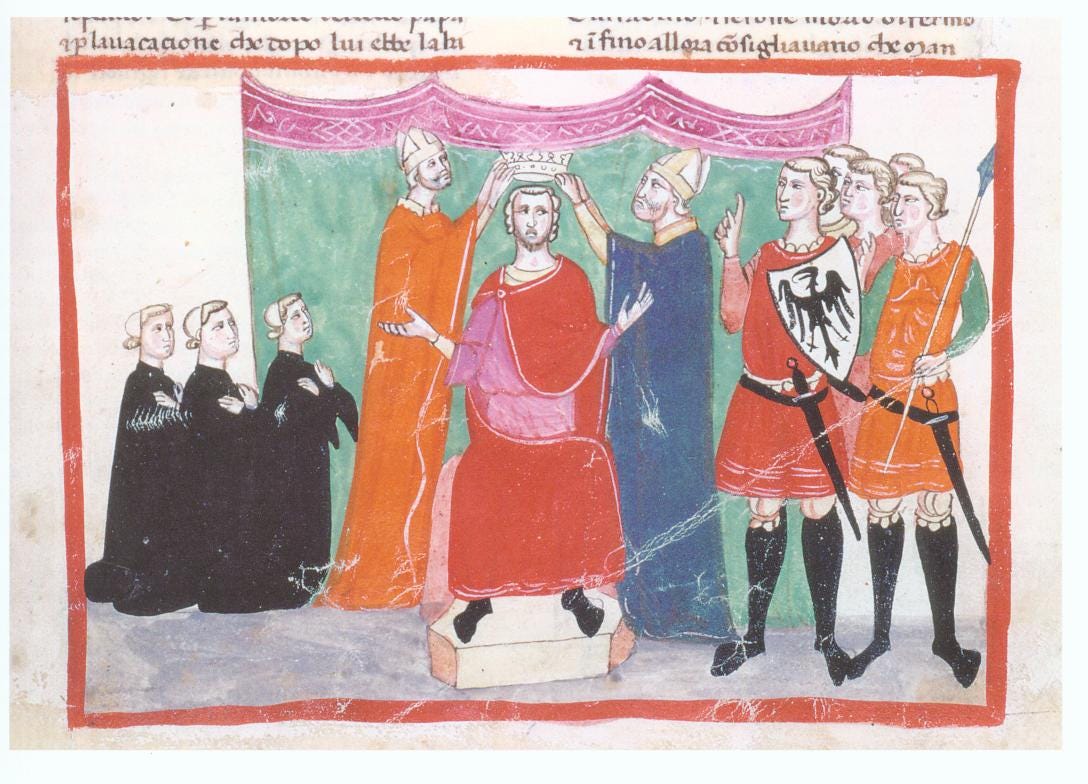Dear Readers of the Manly Saints,
I wanted to let you know that there will be no Manly Saints for the next three weeks. I’m going to be on the road for a little while. However, that doesn’t mean you won’t be hearing from me, because…
I am just delighted to announce that friends and I are starting a new venture here on Substack. It is a free quarterly Substack / audio magazine called Tradition Magazine. It’s about tradition broadly construed, the way I hope I present it here on the Manly Saints: a thing of wonder and beauty that has value for everyone. The magazine will feature original articles alongside authors from across Catholic history, the old mingled with the new around a theme for every issue.
The theme for the inaugural issue is “Marriage”.
You’ll find pieces silly and serious, insight alongside snobbery, theology next to ghost stories. The issue includes short pieces from G. K. Chesterton, Charles Coulombe, Pope Leo XIII, Substack’s own Nick Sledge of Catholic Manhood, Plato, Dr. Leon Podles, Erasmus, Bonnie Landry, the Goodman of Paris and many more.
Our inaugural issue will come out in early June. I’ll crosspost my introduction and Table of Contents here on the Manly Saints so you can take a look. The Manly Saints will be back in mid June.
Until then,
Hugh
Join me today to meet a Blessed who was one of the most famous men of his time before vanishing without a trace.

Name: Matteo da Termini, Agostino Novello
Life: 1240 - 1309 AD
Status: Blessed
Feast: May 19
You can listen to this as a podcast on Apple Podcasts, Pocket Casts, Spotify or right here on Substack. If you prefer video, you can also follow on YouTube and Odysee (unfortunately, videos on Odysee may be slower to update).
The Italian lawyer looked at the document again. What he was reading could not exist. Most of it was fine, a perfectly ordinary legal case defending the rights of a small community of monks. But right at the end was a short, handwritten addition, a powerful argument squeezed into a few lines that pretty much rendered the rest of the submission unnecessary.
The lawyer turned to his colleagues and told them he could only think of three ways this argument had gotten there. All his explanations were supernatural. This could be the cleverness of a demon or the wisdom of the angels. And the third possibility, perhaps the least likely of them all, was that Matteo da Termini, the former lord Chancellor of the realm, had risen from the dead to defend the interests of a small community of monks.
Perhaps some of the younger men did not remember Chancellor Matteo da Termini. If so, the lawyer would have told them the story of the man he had known, a story that was tangled up with the rise and fall of Manfred I, the last hope of the House of Hohenstaufen.
Manfred had been a little older than Matteo. Manfred was born a bastard, an illegitimate son among the many children of the Holy Roman Emperor Frederick II. Frederick ruled Sicily and parts of Italy, but his dominion had extended far beyond that, a huge swath of land running North to South across Europe, from the Baltic Sea down through the German lands to the heel of the Italian boot. For a time he was also, technically, King of Jerusalem.
Frederick II had been a strange ruler, micromanaging his domains in Sicily and Italy. When young Matteo had been a boy growing up in Termini Imerese in the North of Italy, he might have felt the Emperor’s influence in the curfew that applied across the island. But as a boy Matteo was probably much more interested in rumours of the emperor’s zoo at Palermo. Frederick was a student of biology, and he brought the animals he was studying and breeding with him: dogs, exotic birds, cheetahs, giraffes, even elephants.
The Holy Roman Emperor Frederick II was a complicated man. You could make a strong case that his inaction and half-hearted crusading had doomed the Christian holdings in the Holy Land. People even called him “the baptized sultan” after he allowed a group of Muslims who had been driven out of their conquests in Sicily to settle in Lucerna, on the heel of the Italian boot. Then again, it was the Emperor Frederick II who had empowered the Teutonic Knights and aimed them North, launching the Northern Crusades. He had stood against the terrifying Mongols who menaced Europe from the East.
Frederick II also did what his family had done for a long time and wrestled with the papacy for control of Italy. This was the battle of the Ghibellines and the Guelfs, names that were originally German words that had mutated in Italy to leave behind both their original German sound and their original narrow meaning. Now they represented two very broad political factions. On one side were the Ghibellines who wanted the pope to have less temporal power and often favoured the Hohenstaufen Holy Roman Emperors. On the other side were the pope’s political partisans, the Guelfs.
Frederick II had died in 1250, while his bastard son Manfred was still an unproven young man of 18. At that time Matteo was just a boy of ten years old in Northern Sicily. The strange events of the next few decades would bring Manfred and Matteo together.
Frederick left his holdings in Sicily and Italy to his legitimate son Conrad. King Conrad gave his half-brother Manfred the chance to prove himself, and he did, developing into a talented commander. Meanwhile, young Matteo impressed the people around him with his intelligence. Soon he was sent off the island of Sicily, to Italy, to study in a university.
Then King Conrad died, still in his twenties. Conrad left a son, Conradin, though the boy was only a few years old. Sensing weakness, the papacy pushed for power, claiming it was only until Conradin was old enough to rule. The way Manfred saw it, the Guelfs were seizing the moment and extending papal power to Sicily with no intention of ever giving it back.
Or perhaps, some whispered, Manfred merely wanted power for himself. Whatever his motivations, Manfred began to figure out how to get control of Sicily. He went to the one group of allies he thought had most to fear from papal power: the Muslim colony at Lucerna. Their contingent of archers would be the backbone of Manfred’s rise to power. They would also be one of his great weaknesses, earning him the sneering nickname, the Sultan of Lucerna. With the power they gave him, Manfred became recognized as regent for young Conradin.
Perhaps around the time that Matteo was making a name for himself as a brilliant young legal scholar at the university, a rumour swept through Italy that Conradin had died. Some suspected that Manfred had spread the rumour himself. Manfred certainly acted as though he was ready, retrieving the crown jewels that had been held in trust for Conradin in Venice and being crowned himself. By the time it turned out that Conradin was very much alive, Manfred’s power grab was complete.
Was Manfred just power hungry? Maybe. On the other hand, as he surveyed the political field he must have recognized that Conradin was simply too young to defend the lands of the House of Hohenstaufen. Manfred might be an illegitimate son, but he was the best Hohenstaufen left.
And so King Manfred of Sicily set about consolidating what he had taken. He showed strength and resolve, bringing nobles who were flirting with the Guelf position back into line. He kept up his father’s studies, getting interested in birds and writing a book about falcons. And when Manfred heard rumours of a brilliant young legal scholar, he sent for Matteo. Soon Matteo had been promoted to the heart of the administration, as Manfred’s Chancellor, his Prefect of the Curia.
Now that he was in the service of the king, Matteo was surrounded by power and wealth. He lived in a time when churchmen often pursued power as greedily as anyone else. But our sources say that although he dressed the part and learned to snap out orders with the decisiveness and self-confidence of a lord, Matteo held something back. He wanted to be in the world without being seduced by it. He would be the best chancellor he could, helping the poor, maintaining justice, and supporting the king. There were always Guelf tricks to worry about, like the time someone found a beggar who sort of looked like the late Frederick II, and used him as a frontman to stage a short-lived rebellion against Manfred’s authority.
Manfred was now strong enough to support the Ghibelline cause of political independence from Rome, but his power had come at a cost. Many people were unsettled by the idea of opposing the pope, even if it was political rather than religious opposition. And the fact that Manfred was so close to his Muslim colony in Lucerna at a time when the crusader states were being crushed by Islam caused some to wonder where his loyalties lay.
The pope, meanwhile, went looking for a champion in Europe, and finally he found one: Charles of Anjou, brother of the French king. The pope urged Charles to come South to push Manfred out of power. A rumour swirled around the region that Manfred was scared. He was so scared that he had sent assassins to take Charles out and given them so many different varieties of poison that it had needed two donkeys to carry it all.
This may have been anti-Manfred propaganda, because pretty much as soon as Charles and his small army got to Rome the pope started having second thoughts. For one thing, Charles did not have enough men. His knights weren’t very well disciplined either. By the time Charles’ knights engaged in some light looting of the Vatican, the pope was seriously regretting his decisions. Still, the only way to get rid of Charles was to send him to do what he had come to do, and so the pope told Charles where Manfred was and hurried him on his way.
Matteo may well have been with Manfred as they marched to meet the champion of the Guelf cause. The armies came together at Benevento, a little South of Naples. Manfred and Matteo were probably not very worried. For one thing, they had the numbers. The core of Charles’ army were French knights armed with stabbing swords. The core of Manfred’s army were German knights who had learned the Norman way of war. Their horses were bigger, their swords were more massive, and Manfred’s smiths had prepared a technological surprise that Charles’ forces had never encountered before.
But as the armies came together, Manfred made a fateful mistake. There was a good place to face Charles’ forces across a little bridge. Manfred knew it would take his army time to cross, so he divided it up into three sections, with himself in the last one, and his Muslim archers and some German knights in the first section. The first section worked its way over the bridge as the rest waited.
Charles engaged Manfred’s first contingent before the other groups had made it across the bridge. He sent out his ribaulds, his skirmishing light infantry to shoot and hurl weapons at Manfred’s army. Manfred’s men responded by deploying the Muslim archers, who easily outmatched the French ribauld and sent them hurrying back behind the line of armoured cavalry. Charles responded by sending his knights on a cavalry charge, scattering the Muslim archers. This left the German knights on Manfred’s side no choice but to respond with a charge of their own.
The two lines of knights clashed. The massive German warhorses rode irresistably forward. From their smaller steeds, the French knights swung and stabbed at the Germans, only to discover to their horror that they were having no effect. Manfred’s smiths had brought an ancient military technology to life again: plate armour. A long time ago, Greeks and Romans had fought in plate armour. It had always restricted a warrior’s movement, and for that reason it had been largely replaced by chainmail. But Manfred’s Germans were wearing chainmail with sliding plates layered on top. The French stabbing swords were basically useless.
The French were being forced back when one French knight had an idea. He waited until his opponent lifted his heavy blade for a strike before he darted in and stabbed up, into the German knight’s exposed armpit. Manfred’s men were using an early version of plate armour in which a knight’s armpit was only protected by chainmail. The French knight’s stabbing sword punched through the chainmail, and the French started shouting this new trick to one another. Suddenly being lower to the ground was an advantage, since they could aim upward as the Germans tried to swing down on them. As the new technique spread through the French lines, the German advance slowed. By the time the second third of Manfred’s army got across the bridge, the French were winning.
Perhaps if Manfred had ruled over a more unified realm, perhaps if he had shown less preference for the Muslims of Lucerna his lords would have been more willing to fight for him. As it was, the nobles in charge of the second wave of Manfred’s forces took a look at the situation and many decided to run. The French watched the second part of Manfred’s army disintegrate in front of them. Now they only had to deal with the last third under Manfred’s personal command.
And so it was that by the time Manfred got his men over the bridge, he was suddenly outnumbered. His Muslim archers were gone. Even some of the men riding with Manfred decided to take to their heels. Out in front of them, thousands of his German knights had already fallen, the French ribaulds working their way through the field to finish off anyone who was only wounded. Manfred rallied a small group of knights and lords, perhaps including Matteo. If this was to be Manfred’s end, he wasn’t going to go meekly. Manfred led the charge into the centre of Charles’ forces, knowing that there would be no return.
If Matteo was present in this last, heroic charge, he would have seen Manfred’s close defenders fall one by one. He would have seen Manfred fall himself. At some point Matteo too was badly wounded, so badly that the French ribaulds assumed that he was dying or dead already and let him be.
After the battle, it turned out that Manfred had been right about the stakes. He would be the last serious hope for the Hohenstaufen dynasty, and when he fell it was only a matter of decades until his house faded away into history. The lords of Italy and Sicily who had abandoned him would live to regret their decision as they suffered under Charles’ harsher rule. Even the pope would come to regret the events of Benevento, which changed the balance of power in favour of the French and prepared the way for the Western Schism. The House of Hohenstaufen would slip into Germany mythology. Just as the English say that King Arthur waits to return to England in their hour of need, the Germans say that this moment will call forth the great ancestor of the Hohenstaufen, Frederick I Barbarossa, who sleeps under a mountain until the ravens cease to circle the peak and the emperor arises to ride again.
Matteo, as it turned out, was not fated to die on the battlefield of Benevento. Perhaps he waited for darkness before dragging himself out of the pile of bodies. Whatever happened, we know that he was badly hurt, and he doubted that he was going to recover. Everything Matteo had worked to build had been wiped out. The more he thought about it, the less Matteo liked what his life had become. Along with these thoughts came the seed of a monastic vocation. Matteo prayed to live, and promised that if he did he was going to become a monk.
Somewhat to his own surprise, Matteo recovered. When he was healthy enough he went looking for a monastery to join. It was obvious to him that he ought to become a Dominican. The Dominicans put a high value on education; they were an order dedicated to preaching and teaching. They would have a use for him.
And yet, whenever Matteo tried to contact the Dominicans things went wrong. His messages about joining them never seemed to end up with the Dominicans. Instead, they kept getting delivered to a group of hermits who were forming a quiet, poor community near the city of Siena. The hermits looked to the example of the Desert Fathers, and they were developing a new monastic rule to allow them to live together. We call them the Augustinians, or the Order of Saint Augustine, although at the time they were simply the Hermits of Saint Augustine. After his letters kept ending up with the Augustinians, Matteo recognized that this was where God was calling him to go.
Matteo left the world he knew behind and put on the simple Augustinian habit. He took a new name as well, the name of their patron, Saint Augustine. And so Matteo became Brother Agostino, later adding a second name, Novello.
Brother Agostino Novello had not intended to become a quiet hermit. But his spiritual life blossomed in the silence and humility. At first it was difficult to unlearn the lordly habits he had gotten used to. Sometimes he still barked commands at the other monks. But then Brother Agostino would fall down on his knees and beg his brothers to forgive his proud words. Soon the powerful Chancellor had all but faded away and Brother Agostino was all that was left.

Brother Agostino found that he was happy - far happier than he had ever been as a Chancellor. But one day, the monastery where he had been sent received a legal challenge. It seemed pretty clear to Brother Agostino that they had a good case, but everyone else was worried about how things would go. The more he watched his brothers panic, the more Brother Agostino felt like he had to do something. And so he humbly asked if he could write an addition to their legal case. The man who had been paid to put the monastery’s case together chuckled at the request from what everyone assumed was a barely literate monk. Brother Agostino wrote his short argument, added it to the file, and that was that.
As fate would have it, the lawyer who was reviewing the monastery’s case remembered the days of Chancellor Matteo da Termini. The lawyer had to know who this monk was who had written the legal case. Soon he recognized the former Chancellor, and suddenly Brother Agostino was back in the thick of things again.
When the Augustinians learned about Brother Agostino’s background, they encouraged him to study for the priesthood. He politely declined. He loved being a quiet hermit. The leader of the Augustinians had to invoke Agostino’s vow of obedience to force him to become a priest.
Soon Father Agostino was called to Rome. He would become a confessor and an advisor to popes. When the leadership of the Augustinian order became vacant, he was the top choice for the position. Absolutely not, he said. It took a direct order from the pope to get Agostino to take the job.
So now Agostino was back in the halls of power. This was his chance to become a powerful, wealthy man again - if he wanted it. But Agostino had discovered something in the quiet of the monastery that was far richer than his former life. People who met him sometimes joked that the pope had only gotten half of what he demanded: sure, Agostino’s body was running around fixing problems in the Church, but his heart had never left his monk’s cell.
And so after several years of firmly but kindly leading the Augustinians, when his term was complete, Agostino cheefully lost the next election and retired. He was 59. He was a free man, and Agostino returned to the life of a hermit. He would spend the next decade in prayer in the hermitage of San Leonardo al Lago, a little North of Florence in modern Italy. We don’t know much about this period of his life, but we often find Agostino painted or sculpted surrounded by birds. It’s not uncommon for saints to be befriended by wild animals, but still I wonder whether perhaps Agostino had learned to love birds from conversations with King Manfred.
Agostino died at 69. He didn’t have a will. The old hermit no longer owned anything to leave behind.
Blessed Agostino Novello was hailed as a saint almost immediately. Locals asked for his prayers, and they found help and healing. One of my favourite stories is about a man who asked for a miraculous healing through the Blessed’s intercession and his prayers were answered. The man had promised to do some devotion if he got better, but once he was better he forgot all about it. Just as miraculously as it had gone, the condition appeared again. Now scared, the man asked Blessed Agostino to pray for him a second time and promised he would get to the devotion . If there was one thing Blessed Agostino Novello understood, it was the frailty of the human heart. The man got his second miraculous healing.

Why was Blessed Agostino Novello so popular so quickly? Some people chalk it up to novelty. But I wonder if what stood out about his life wasn’t the fact that he could speak with authority about wealth and power. People always said that wealth and power don’t matter, yet many Christians chased after these things, and besides it was hard to trust the word of someone who was as poor and powerless as you. As the 14th century opened, Guelfs battled Ghibellines, corrupt bishops got rich and the Church lurched toward the madness of the Western Schism. But there were still some men like Blessed Agostino Novello. He had been rich and powerful. He knew exactly what he was turning down when he eagerly left the world behind for a small cell in a monastery and a life of humble prayer.
If you enjoy the Manly Saints Project, please consider signing up for a subscription on Substack, or click here or on the logo below to buy me a beer.







